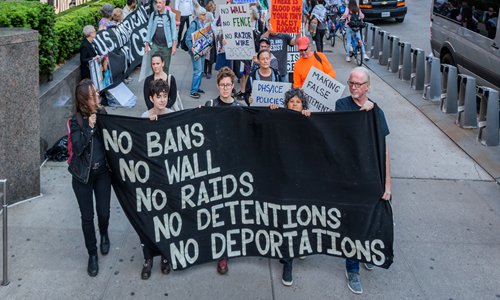HOME >> OPINION
The perilous plight of illegal immigrants in US
By Rong Xiaoqing Source:Global Times Published: 2019/7/18 20:06:54

Activists in New York City used the opportunity on Trump's birthday with a demonstration outside the Trump International Hotel on June 14, 2019 to peacefully draw attention to the administration's cruel and inhumane immigration policies, and to demand that folks arriving in the US are treated with dignity and care. Photo: IC
Sunday, July 14th was a bright, sunny day. Everything seemed to be normal in the orbit of my life. Loved ones were happy and healthy and enjoying the summer relaxing however they liked. Neighbors gathered on the rooftop "sky room" for a bagel brunch party thrown by our apartment building. Outside the glass door that kept the cool air in, some children were splashing water on one another in the outdoor swimming pool that was glistening in the sun.
A perfect summer's day, I thought while trying to put off the disturbing buzz from something on the distant horizon of my consciousness. What was it? Then, I remembered. This was the day the Trump administration said it would start an operation to arrest illegal immigrants in 10 cities, including New York. My bagel suddenly tasted waxy.
Debates on immigration issues in the US are often addressed on a simple judgmental scale of right and wrong. But this is a particular field where the weight of human lives can blur the line. In terms of legality, it may be wrong for immigrants to cross the border without papers, and it may be right for the government to enforce its immigration laws. But is it right for the government to turn a blind eye for decades and allow these people to put down roots here, only to move to drive them out after they have established their families and businesses?
As a community leader from East China' Fujian Province, a major source of undocumented Chinese immigrants told me, "If you deport them when they just arrive here, they'd lose some smuggling fees at most. Now they have their American-born children or American-citizen spouses. One person's deportation can break a whole family."
To be sure, authorities said they only target people who have been issued deportation orders by a court, an assertion that they are merely serving justice. But the deportation order is by no means an accurate measure of who deserves to be sent packing and who doesn't.
Studies have shown that the disparity in denial rates for asylum applications in different immigration courts around the country can be as high as 75 percent. Even in the same court, different judges have different standards. In the San Francisco immigration court, for example, denial rates of judges were anywhere between 97 percent and just 10 percent in 2018, according to the Transactional Records Access Clearinghouse at Syracuse University that tracks the data.
When your case is denied, and you exhaust opportunities for appeal, you get a deportation order. Or you could get one simply by missing a court date, even if it's because the postman fed your appearance notice to a stray dog on the street. A deportation order, therefore, is often not a reference to right and wrong but a testament to the randomness of fate.
But this is not even a debate about right and wrong. President Donald Trump doesn't seem to be interested in complicated moral issues. He may not even be interested in purging illegal immigrants out of the country. He was just doing what has been proven to be his unique strength, stirring fear.
A newly released report by the American Immigration Council shows that the number of people who were deported in Trump's first year was not much different from the number in the last year of former president Barack Obama, and the proportion of noncriminal immigrants deported in both years was basically the same. Even the latest raids, for which the drumbeat had been sounding for months, only had 2,000 targets, and the actual arrests turned out to be only a fraction of that, so far at least. This is in contrast to the estimated 11 million undocumented immigrants living in the US - it is less than a drop in the bucket. But Trump clearly would like illegal immigrants to believe that he is determined to catch them all.
The fear was tangible at least on that particular day when the scope of the enforcement was still unfolding. "So frightening," a friend from Fujian told me when I called him on that day to see how people were preparing for what could be a calamity for them. "I've been in the US for more than 20 years. I haven't seen this before."
The friend, although he was smuggled into the country, obtained a green card a long time ago. But he has many friends who are undocumented. That made me realize that I have friends' friends who are in peril. And the chain can go on and on.
In a city like New York where about 40 percent of people are foreign-born and among them one fifth are undocumented, the chances are that everyone knows someone, be it a family member, a friend, the deliveryman bringing you lunch or the nail salon lady doing your manicure, who hid in their apartment or a friend's apartment on that day, with their curtains drawn, their children muted, and their anxiety immense.
When terror is so pervasive, no one is spared.
The author is a New York-based journalist and Alicia Patterson fellow. rong_xiaoqing@hotmail.com
Posted in: VIEWPOINT